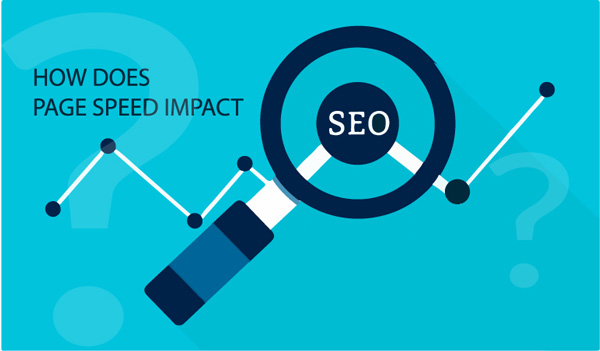Page speed is a confirmed ranking factor. So, yes, it is critical for SEO.
Beautifully enough, the influence of page speed doesn’t stop SEO. It [the influence] also spreads to other critical areas of digital marketing.
Read all the details in this article.
Here, you’ll find how the metric works. More importantly, I’ll show you how to check it.
What Is Page Speed?
Definition
Like the phrase, “page speed” is how fast a page loads. By that definition, you can also call it “load speed.”
Note:
Page speed isn’t the same as site speed. The latter is an aggregate score for the pages on your website.
Furthermore, page speed isn’t just a metric by itself. It depends on several elements.
What are the elements? How do they work? How is the entire thing calculated?
Let’s find out…
How Does Page Speed Work: What Are Its Elements?
For starters, page speed works differently on mobile devices than on desktops. And while you should fix the two, prioritize the former. Here is why:
Mobile-first indexing…
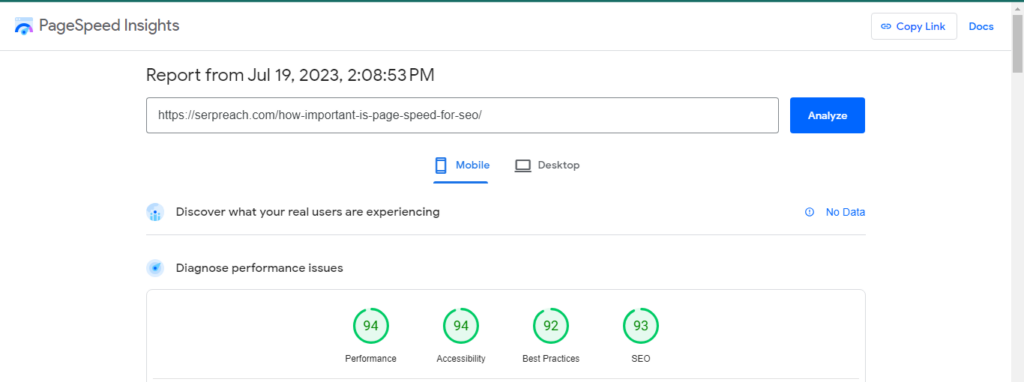
Mobile-first indexing means Google uses the mobile version of your site to index and rank it.
Whether mobile or desktop, 3 crucial elements determine the speed of your pages:
- Time To First Byte (TTFB): the time it takes to load the first byte of data on your page. It reveals server issues.
- First Contentful Paint (FCP): how long it takes for the first element on your website to load. The “element” can be a text or image [even a background image].
Like FCP, there is another element: Time To Interactive (TTI). It measures how long your page’s “interactive elements” load. It also reveals javascript issues.
- Loading/onload time: the time it takes for a page and all its elements to load.

The first, second, and third image represents TTFB, FCP, and onload time respectively.
Source: Semrush
So, how about how page speed is calculated? How do you know if your pages are slow, moderate, or superfast?
As mentioned, page speed is an umbrella term for other metrics. So to calculate it, Dev tools note the elements and output the average.
Sounds complicated, huh?
Let’s use Google’s Core Web Vitals.
What Is The Standard By Google?
Google’s Core Web Vitals use a 3-metric system to qualify a page’s loading speed, interactivity, and stability.
- Largest Contentful Paint (LCP): the time it takes for the primary content to load.
- First Input Delay (FID): is how long you’ll wait to interact with the “loading page.”
- Cumulative Layout Shift (CLS): how long it takes for a page to be stable.
Layman’s explanation:
For example, say you were surfing goal.com for transfer window news. The page will likely first load the logo and the head tag. That’s the LCP.
But you’d still wait a bit to scroll through the news. That’s FID.
While loading, an image won’t be in its final position. It might dangle about until the page fully loads. Then, the element will assume the design position. That is the CLS.
That said, here is Google standards for page speed:
- For LCP: superfast pages load in 2.5 seconds or less. Moderate speed is higher than 2.5 but less than 4 seconds.
Anything higher than 4 seconds signifies a slow-loading page.
- For FID: users can interact with superfast pages in 100 milliseconds or less. Moderate-speed pages are higher than 100 milliseconds but lower than- 300 milliseconds.
An FID score higher than 300 milliseconds needs an urgent fix.
- For CLS: superfast pages should have a score of 0.1 or less. Moderate-speed pages are higher than 0.1 but less than 0.25.
Pages with CLS scores higher than 0.25 need urgent solutions.

How can you check your LCP, FID, and CLS scores?
Thankfully, you don’t have to do it manually. There are several tools you can use — and they are free.
3 FREE Tools To Check Your Page Speed
Here is a quick overview:
Before I discuss the basic how-tos for the listed tools, know this:
- Page Speed testing tools might reveal varying results. They use unique and different unique to the developers.
- Regardless of the tool used, your results will be based on field or lab data (or both).
- Field data, also known as Real User Measurement (RUM), reveals your site’s performance from a “real users” standpoint.
- Lab data, also known as synthetic measurement, reveals possible outcomes in a simulated environment.
That said, let’s delve straight into the practicals: let’s check your page speed. 💪🏾
Google Lighthouse
FYI: Google Lighthouse only uses lab data. Also, it focuses more on your aggregate site speed than just a singular page.
There are several ways to use Google Lighthouse. But I prefer the ease of the Chrome extension method.
Here is how the method works:
- Add Lighthouse from the web store to your Chrome.

- Pin the extension and click on it while surfing the target page
- Click “Generate Report;” and you’ll see a result page like this:
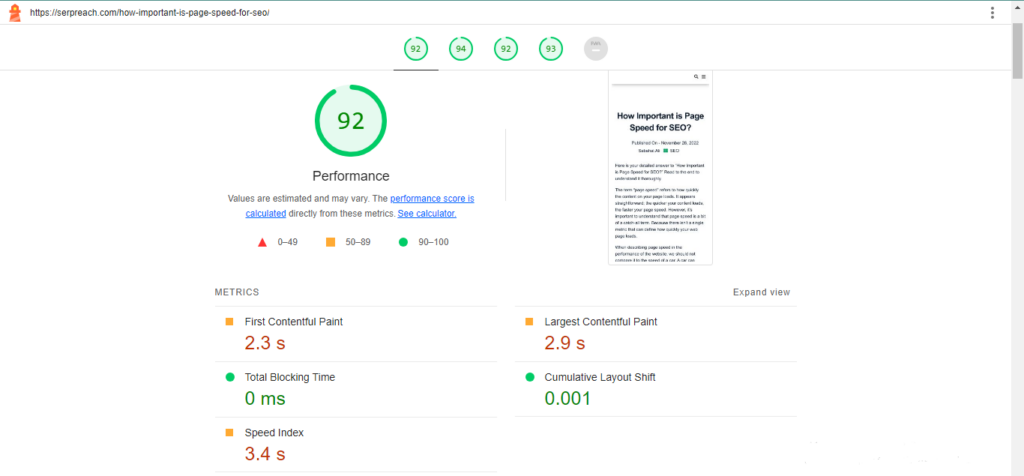
Heads up:
If you try the Google Lighthouse web user interface method, you’ll be directed to PageSpeed Insights.
Google PageSpeed Insights
Unlike Lighthouse, PageSpeed Insights use field and lab data. It gets the former from Lighthouse and the latter from Chrome UX Report.
Furthermore, PageSpeed Insights only let you check the speed of a page — unlike Lighthouse.
How to use PageSpeed Insights:
- Go to PageSpeed Insights
- Paste your URL into the search and analyze

Did you notice that the report from PageSpeed Insights is positive while Lighthouse is not?
Weirdly, the tools are from the same developer, and I tested the same URL. And we saw two different results.
So, you see, the tools show varying results.
GTMetrix
GTMetrix is undoubtedly one of the easy-to-use, good-looking, and beginner-friendly page speed test tools. With it, you can also test your page performance across different server locations.
However, you must register an account. Otherwise, the default location will be Vancouver, Canada.
How to use GTMetrix:
- Go to GTMetrix
- Enter your URL into the bar and click “test your site.”
The result comes with suggestions to fix your site speed.
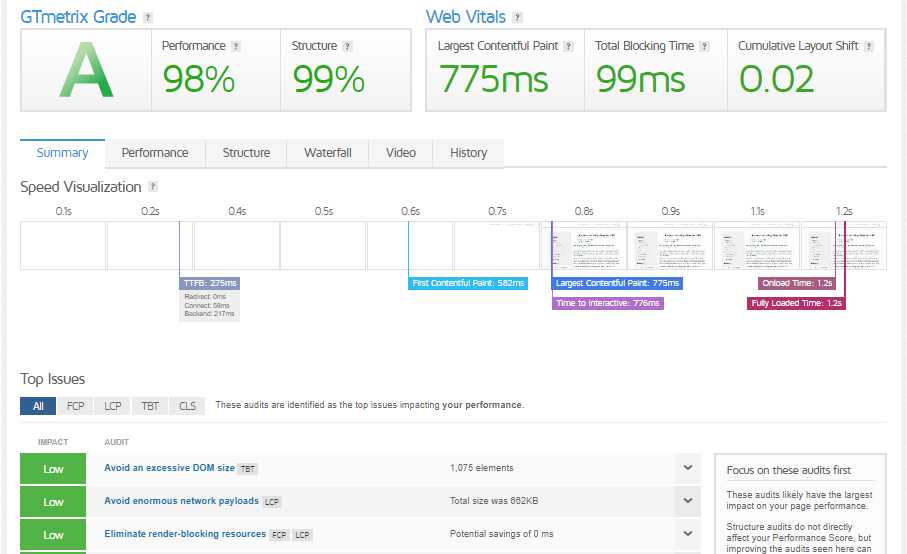
Other tools you can try:
- Pingdom — is also free. It lets you test your page speed and choose the server’s location. Like PageSpeed Insights, you can check the speed of a singular page.
- WebPage Test — is also free but robust. With it, you can test your speed while tweaking conditions such as browser, connection, and server location.
Now, you might be wondering:
Why all the stress? Why test your page speed? Is it that important?
How important is page speed for SEO?
Does Page Speed Impact SEO?
Short answer: yes!
And mind you, it impacts more than SEO.
Page speed reduces loading times and improves your rankings, user experience, and conversion rate.
Such a case is rare where an SEO metric benefits everyone and everything. That is why page speed is such a big deal.
Page Speed and SEO
In 2010, Google announced that page speed would be one of the ranking factors for their search engine. But it was only desktop-based back then.
By July 2018, the Speed Update was official. And it focused on mobile page speed. The Page Experience Update came along in May 2021.
Since then, page and site speed has emerged as a crucial factor in how search engines rank pages.
Google doesn’t want to produce results that are slow to load and turn off users. With the updates, results will be relevant, high-quality, and responsive.
Page Speed And User Experience
No one will stick around on heavy, slow-loading sites. They want their information in concise bits and super fast. Otherwise, users will bounce off your site.
And here’s proof to back the statement:
A mobility report by Ericsson reveals that slow-loading pages are one of the stressful situations.
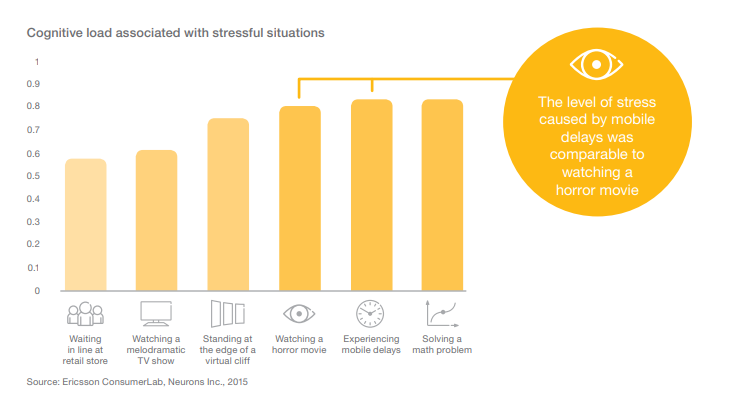
Bottom line:
Fast-loading pages make users happy. That will lead to more quick decision-making, conversion, and sales. The best part: Google will push your content and site up in search results.
Page Speed And Conversion Rate Optimization (CRO)
As I mentioned earlier, fast-loading pages aid conversion. Here is how:
Say you were thrilled about a new Nike shoe. You went on Amazon to check the specs. Unfortunately, the page is still loading after 15 seconds.
Won’t you be frustrated?
Won’t you likely close the page?
If you were still interested in the shoe, you’d likely go to another site. That’ll be a loss for Amazon.
The dissatisfaction aside, slow pages will actually lead to increased bounce rates. The dissatisfied user will likely speak ill of the brand. Google will also demand the site since people bounce off almost as soon as they visit.
Fast Pages Save Money
Users are not the only beneficiary of a fast-loading page. They get what they need and make their decision superfast.
And you’ll make money.
But do you know you save money in the process too?
Here is how:
From experience, I noticed several slow pages are so because they contain heavy elements. That led to expensive site maintenance fees — such as dedicated hosting.
Note:
Dedicated hosting is essential for corporations with businesses that warrant it. It isn’t recommended for a startup with zero net sales. A shared host would be the best option in this case.
So, by removing the heavy elements, your site maintenance fee will be slashed. Even better, your pages will load faster.
But that’s not all…
Google also benefits. How?
Fast-loading pages and sites mean fewer resources from Google. The company will spend less on increasing bandwidths.
Bottom line:
Google will be happy with you. And that’s better than the alternative: deranking you on search results…
Page Speed And Search Engine Crawling
Heavy sites don’t only affect speed. They also impact the crawl rate.
The bots will take longer to crawl and index your pages.
How come?
When crawling a page or site, all the elements [rich, text, and video] are first downloaded separately to understand the site.
Imagine how long that process will take when you have tons of such on your pages.
Perhaps that’s why your pages are not indexed yet.
The way out:
Optimize your page & site speed. It can enhance your crawlability and indexability.
But how? How can you optimize your page speed?
Optimizing Your Page Speed
As simple as page speed might seem, it is still a technical metric. So, if you don’t have any technical expertise, I recommend you outsource the fix.
What about the tools?
Indeed, you can follow the suggestions of GTMetrix and Google Search Console. In my experience, however, you’ll still need an expert’s opinion. My 2 cents!
Nevertheless, there are some things you can do from your end. Here are some simple DIY hacks:
Use Simple Image Formats
Avoid heavy images, regardless of the file type. If you must use the image, compress it via free tools — or Canva Premium.
And talking about file types, PNG is often lighter than JPEG. I recommend you use the former. But there is a better format: WEBP.
WEBP takes the positives of PNG and JPEG. It is light and high-quality. Unfortunately, not all browsers support the format yet.
Note: there is a way around using WEBP on WordPress sites. Use a plugin. It will convert your WEBP to JPG or PNG for browsers that can’t read it. I recommend EWWW Optimizer for this task.
Also read: How To Improve SEO On WordPress
Use A CDN
CDN [Content Delivery Network] entails interconnected servers. It is distributed across several cities and countries and makes sites load fast.
Here is how:
- When you subscribe to a CDN service
- The CDN will cache your site on its servers
- When a user attempts to visit your site, a CDN sends the cached site from the nearest server
- This way, your page will load fast
But remember, not all CDNs are worth the buck. I can only vouch for Cloudflare.
Use The Right Host
Frankly, this part requires no explanation. A good host will not only affect your page speed. It will also affect your entire business.
It is a no-brainer to choose the best host and hosting provider.
Page Speed Is Important. But It’s Not Everything.
The impact of page speed on digital marketing is enormous. It enhances SEO, conversion rate, and user experience.
So, by all means, check and confirm your pages adhere to the standard. Use the tools and suggestions in this article.
But remember this:
Page speed is only one of the several ranking factors Google uses. Focus on everything to get sustainable results from your SEO campaigns.
